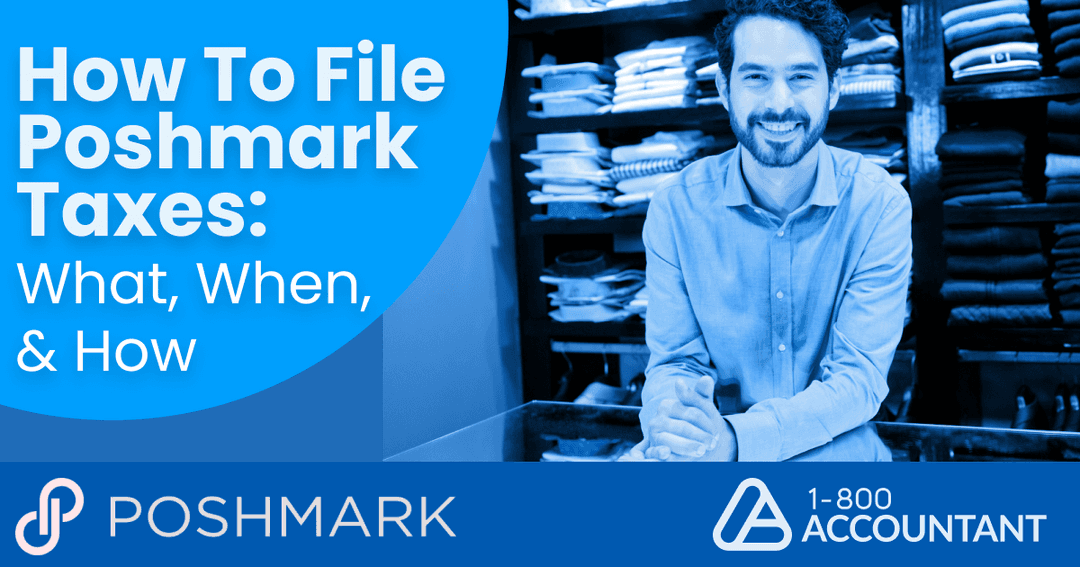
Poshmark enables over 80 million users to buy and sell new and used clothing, home goods, and electronics. While some Poshmark sellers use the platform casually, others sell enough to make it a serious side gig. Taxes likely weren't a consideration when you created an account, but if you've been selling on Poshmark, it's essential to know the what, when, & how related to your tax responsibilities.
Use this blog article as your comprehensive guide to Poshmark taxes, from people selling personal items to self-employed gig-style individuals running a business. It covers important taxes you must file, sales tax considerations, essential tax forms you'll need to prepare and file your taxes, and tax write-offs you can take to reduce your taxable income, if applicable.
What Poshmark Taxes Must You File?
The taxes you file depend on how you use the Poshmark platform. Read on to learn about the tax forms and other information you'll need for your Poshmark seller category.
Taxes When Selling Personal Items on Poshmark
You will have the fewest tax responsibilities if you rarely sell personal items on Poshmark, perhaps once or twice a year.In this scenario, the typical Poshmark seller might offer a used piece of clothing or another personal item for less than they paid when the items were new, which is relatively common in the secondhand market. However, there are instances where a used item will exceed its value when it was new.Whether you sold a used item for a profit or a loss, it is a best practice to report the sale on your tax return. Use IRS Form 1040, Schedule 1, to report a loss, and IRS Form 8949 and IRS Form 1040, Schedule D, to report a gain from your personal Poshmark sales.
If you're having trouble preparing and filing your taxes, 1-800Accountant's personal income tax preparation and filing solution can help.
Taxes When Poshmark Is Your Hobby
If you sell more than a few items on Poshmark per tax year but don't operate as a business, these activities are typically considered a hobby for tax purposes. Determining the line between a business and a hobby can be difficult, but the Internal Revenue Service (IRS) has offered several factors to help you make that determination, including:
Whether you carry on your Poshmark activities in a businesslike manner and maintain complete and accurate books and records.
Whether you have personal motives for selling on Poshmark.
Whether the time and effort you put into Poshmark selling indicates you intend to make it profitable.
Whether you depend on Poshmark income for your livelihood.
Whether your losses from selling secondhand items are due to circumstances beyond your control.
Whether you or your advisors have the knowledge necessary to carry on Poshmark sales as a successful business.
Whether you were successful in making a profit in similar activities in the past.
Whether Poshmark selling makes a profit in some years and how much profit it makes.
Whether you can expect to make a future profit from the appreciation of the assets used while selling on Poshmark.
If you've determined that you are operating as a hobby on Poshmark, you will owe state and federal taxes on any income you've received. However, you will not be considered a business, which exempts you from claiming tax deductions and being responsible for associated taxes, including the 15.3% self-employment tax. Poshmark hobbyist sellers typically use IRS Form 1040, Schedule 1, to report income. If doing your Poshmark hobbyist seller taxes is challenging, save time using 1-800Accountant's affordable personal income tax preparation and filing service.
Running a Poshmark Retail Business
Selling on Poshmark as a self-employed individual comes with increased tax responsibilities versus selling rarely or as a hobby on the platform. You'll use Schedule C to report your Poshmark business income and expenses. Schedule C calculates taxable income for your IRS Form 1040, which must be attached when you submit it to the IRS.
You'll also be responsible for paying the 15.3% self-employment tax that funds Social Security and Medicare and quarterly estimated taxes four times annually. Quarterly estimated tax payment due dates for the 2025 calendar year include:
April 15, 2025
June 16, 2025
September 15, 2025
January 15, 2026
Use IRS Form 1040-ES, Estimated Taxes for Individuals, to calculate and pay your quarterly estimated taxes. The form includes payment vouchers and instructions for filing online.
If you struggle to make accurate calculations by each deadline for your Poshmark business, our full-service quarterly estimated tax solution can help.
Sales Tax and Poshmark
US-based Poshmark sellers are not responsible for collecting, calculating, and remitting sales tax. The Poshmark platform typically makes these calculations and collections automatically, but that doesn't necessarily indicate you have no sales tax responsibilities. For example, you may still be responsible for submitting a sales tax return.
The Poshmark buyer's city and state determine the sales tax associated with each order.
Reporting Poshmark Taxes: What Forms Do You Need?
Whether you infrequently use Poshmark to sell personal items, use the platform as a hobby, or sell there regularly as a business, these are some of the forms and materials you may need to file your taxes.
IRS Form 1040. File Form 1040, U.S. Individual Income Tax Return, to report taxable income and calculate your tax liability for the year.
IRS Schedule 1 (Form 1040). Use IRS Form 1040, Schedule 1, Additional Income and Adjustments to Income, to report personal or hobbyist income you receive from Poshmark sales.
IRS Schedule C (Form 1040). Report your income on IRS Form 1040, Schedule C, Profit or Loss from Business. Schedule C reports your self-employment income and business tax deductions.
IRS Schedule D (Form 1040). IRS Form 1040, Schedule D, Capital Gains and Losses, is used to report a gain from a personal Poshmark sale.
IRS Schedule SE (Form 1040). Form 1040, Schedule SE, Self-Employment Tax, should be used to report your income and calculate the self-employment tax liability. You’ll also need to pay income taxes, but you can deduct half of your self-employment tax.
IRS Form 8949. IRS Form 8949, Sales and other Dispositions of Capital Assets, should be used to report personal Poshmark sales.
IRS Form 1099-K. Poshmark will prepare and send this form to the IRS and to you by the end of January. You will not submit Form IRS 1099-K to the IRS. Instead, you will use this information to help determine your tax liability by applying it to your Schedule C on IRS Form 1040.
Poshmark Tax Deductions and Write-Offs
Tax deductions for individuals who sell on Poshmark as a business can lower their taxable income. Sellers who offer personal items infrequently on the platform or as a hobby are ineligible for tax deductions. Consider the following deductions and make sure to keep detailed records supporting each deduction you intend to take.
Fees and commissions. If you've used the legal services of a lawyer, an accountant for tax preparation, or other professional services for your Poshmark business, those fees are usually tax-deductible because they are a normal part of doing business. This also applies to fees you may pay for membership in certain professional networks or organizations. Those costs are tax-deductible if your membership or subscription is entirely used for business purposes.
Operating expenses. Capital and supply costs, including significant expenses like new buildings or equipment and smaller costs like raw materials and ongoing shipping and packaging needs, can be recorded and claimed as business expenses.
Labor. Paying your employees is one of the necessary and ordinary costs associated with running a business. Your payroll and contract labor costs, including administrative expenses, should be tax-deductible. If you reimburse your employees separately for expenses they make on behalf of the business (via a personal credit card or cash), these may also be claimed as tax-deductible expenses.
Marketing. Marketing is crucial to attracting clients and establishing your business on Poshmark. Therefore, most marketing costs can be claimed as tax-deductible expenses. Business marketing expenses are deductible as long as they only serve an advertising purpose instead of a personal purpose. If you buy something for your marketing initiatives, it is an asset you have purchased that can be deducted over time via depreciation.
Home office. If you run your business out of your home, you might be able to deduct a portion of your housing costs as business expenses. However, to qualify for reimbursement, you must have an accountable plan. It would be best if you had an area of your home explicitly designated for business purposes only. The home office deduction will then allow you to deduct a portion of your rent, utilities, mortgage, and other housing-related costs corresponding to the portion of your home used for your business. Other personal properties you make use of for Poshmark business purposes may also qualify. The office space must be your principal and regular place of work, and you should be able to support your claim with clear documentation, including its square feet.
Business expenses. Telephone, internet, and other costs related to your office that are necessary for your work are typically deductible. If you also use your phone and internet for personal use, deduct the portion used solely for conducting business on Poshmark.
The Easy Way to File Poshmark Taxes with Expert Support
Preparing and filing your taxes throughout the year can be difficult and time-consuming, especially as you run the day-to-day operations of your thriving Poshmark business. When mistakes or a missed deadline occur, you could invite penalties and additional scrutiny from the IRS, further stressing your business and yourself. That's why many self-employed individuals trust the tax professionals 1-800Accountant, America’s leading virtual accounting firm, for their financial needs.
Whether you need business tax preparation, tax advisory, or any of our professional accounting services, we have affordable solutions to ensure your self-employed business remains compliant throughout the year. Schedule a quick consultation–usually 30 minutes or less—to learn more.
This post is to be used for informational purposes only and does not constitute legal, business, or tax advice. Each person should consult his or her own attorney, business advisor, or tax advisor with respect to matters referenced in this post. 1-800Accountant assumes no liability for actions taken in reliance upon the information contained herein.

